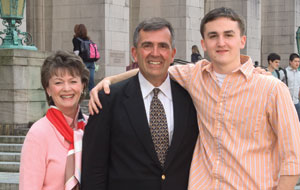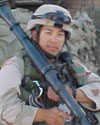

There are now hints of troop withdrawals. At one press conference during his tour of duty, Chiarelli told reporters that "you don't build an army in a few months or even a couple of years." Yet he is upbeat about the prospect of some American troops returning home. Current plans call for Iraqis to take over security for most of Baghdad around the first of the year, he explains.
They are already in charge of one of Baghdad's main districts, the neightborhood around Haifa Street.

But it doesn't mean the insurgency is just going to disappear. Chiarelli admits that there are still crushing conditions in Baghdad that contribute to the uprising. "If you had 13 mouths to feed and you were surrounded by garbage and sewage and you were unemployed and someone offered you money to do something against coalition forces, you'd do it if you had to support your family," he declares.
Loss of honor, he says, is another factor in recruiting insurgents, as well as distrust of the Americans. "The Iraqis thought that the coalition was going to fix everything. After all, we were the people who put a man on the moon. They thought if we didn't fix the electricity, if we didn't clean up the sewage, it was because we didn't want to get it done," he adds.
But he says the "mainstream media" often tell only half the story when it comes to the insurgency. "They reported how a suicide bomber killed 100 men at a police recruiting station. They didn't report that the next day, 300 showed up to apply."
Also missing is much coverage of what Chiarelli calls "a terrible mistake" by Al Qaida leadership. Osama bin Laden, who is a Saudi, named Jordanian terrorist leader Abu Musab al-Zarqawi the "prince" of Iraq. That two foreigners would decide to impose their own leadership on the nation was offensive to most Iraqis, he maintains.
Chiarelli feels that Iraq and its allies may be turning the corner on the domestic insurgency. "If we can get these insurgents under control, maybe we can focus on international terrorists in Iraq."
While Chiarelli is upbeat about future prospects for Iraq, he doesn't like to look back. Point out to him that many of the justifications to go to war-such as that Saddam Hussein had weapons of mass destruction or links to Al Qaida-turned out to be wrong, and he sidesteps any criticism of U.S. policy. "I'm not a policy guy," he says. "I can't comment on that. You are putting me in the position of a policymaker. That's something that the American people have to decide."
Asked about criticism by Sen. John McCain and others that there were not enough troops in Iraq to secure the country after the invasion, he replies, "I had enough forces that I needed to do the mission assigned to me. It's the truth."
Mention the prisoner abuse at Abu Ghraib, which happened before the First Cavalry arrived in Iraq but broke in the press during its tour of duty, and the general will talk about the "glass being half full." He says he told Iraqis that Americans don't run away from these incidents, and that once the abuse was known, "we absolutely followed the rule of law" in each case.
It's no surprise that the general is more comfortable talking about a subject close to his heart. "The real story is the success of the U.S. Army to adapt to a new kind of war," he says. "It amazes me, the adaptability of the American soldier."
He discusses at length the non-lethal operations of occupying Baghdad. He says his unit's four main non-lethal tasks-improve infrastructure, teach democracy, create jobs and provide information-were oftentimes more important than traditional Army tasks.
"If people's human needs are not met, it's going to be an opportunity for the insurgents to recruit," he says.
Here's where his two years in the Evans School of Public Affairs (he has a master's degree from the UW and a B.A. from Seattle University) come in. Chiarelli will rattle off statistics about improvements to Baghdad as if he were a city planner-or even its mayor. When the U.S. arrived, only 20 percent of the household garbage was picked up at least twice a week. Now Chiarelli brags that 75 percent is picked up twice a week and 90 percent at least once a week. His troops delivered running water to 200,000 homes in the city just a few weeks before they left for Fort Hood.
The unemployment rate in Sadr City, Baghdad's notorious slum, was 61 percent when the First Cavalry arrived. Now it is down to 21 percent. He talks about the price of labor and looks forward to the day when workers will be wooed away from the Army's "WPA" projects that pay $5 to $7 a day.
Which is all rather unusual coming from a general running a mechanized Army division with the First Cavalry's history. The unit can trace its roots back to 1833 and counts among its antecedents the troops under General George Custer that were annihilated at the Battle of Little Big Horn. But Chiarelli says that the two years he spent at the UW-and the next four years he spent teaching at West Point-gave him the tools necessary to be a success in Baghdad. "I always tell young officers, you need a broad-based education," he says.
Which brings him back to the elections of Jan. 30. He says the seeds of democracy planted in Iraq are spreading.
Citing recent events in Lebanon and Egypt, he says, "What you see are signs of democracy throughout the region. This is really something."
"After the elections, the mayor of Baghdad told me, 'The governments of the region are nervous. The people of the region are envious.'"
Tom Griffin has been editor of Columns since it was launched in 1989.
 Stan Seo, '93, Captain, 281st Military Intelligence Company, 81st Brigade Combat Team, Washington Army National Guard; Time of service: March 2004-March 2005; Stationed: Camp Anaconda, near Balad; Currently: Mill Creek
Stan Seo, '93, Captain, 281st Military Intelligence Company, 81st Brigade Combat Team, Washington Army National Guard; Time of service: March 2004-March 2005; Stationed: Camp Anaconda, near Balad; Currently: Mill Creek
"I was manning the entry control point at the airbase over there in Anaconda. At my entry control point, we got everything. We got indirect fire, mortars and rockets. We had small-arms fire on a regular basis-people shooting at us or near us. And then we also had what are called VBIEDs, vehicle-borne improvised explosive devices. . The friendships were what enabled us to kind of work through it. We had a group, we called it the Captain's Cove. We built a little deck by our hooches, and every so often when we all had a chance, or when it cooled off to, like, 90, we'd be out on the deck. Just a quick sanity check. Shoot the breeze. Drink our near-beer. We had our spades games, our poker games. And we were able to commiserate about all the issues we had. For me, personally, that's what kept me sane. That and being able once in a while to get a hold of my wife on the phone." Read more of Stan's story at: War Stories: Huskies in Iraq
Go To: Page 1 | Page 2 | Page 3
War Stories: Huskies in Iraq. On-going web exclusive about Huskies serving in Iraq.
Questions for the Vets. A web exclusive with questions to those serving in Iraq.
Loss and Recovery: UW Expert Aids Army Amputation Units